

Partner Jeffery Amherst, John "Jack" Chapman Wilson, Graham Payn
Queer Places:
131 Waldegrave Rd, Teddington TW11, Regno Unito
Prince of Wales Mansions, Prince of Wales Dr, London SW11 4BG, Regno Unito
111 Ebury St, Belgravia, London SW1W 9QU, Regno Unito
17 Gerald Rd, Belgravia, London SW1W 9EH, Regno Unito
37 Chesham Pl, Belgravia, London SW1X 8HB, Regno Unito
56 Lenham Rd, Sutton SM1 4BG, Regno Unito
Italia Conti Academy of Theatre Arts, 14 Lamb's Conduit St, London, Regno Unito
Goldenhurst Farm, Gigger's Green Rd, Aldington, Ashford TN25 7BU, UK
Hotel and Café des Artistes, 1 W 67th St, New York, NY 10023, Stati Uniti
The Campanile, 450 E 52nd St, New York, NY 10022, Stati Uniti
The Sutton Collection, 404 E 55th St, 10022, NYC, NY, USA
Firefly Estate, Ocho Rios, Giamaica
Chalet Covar, Les Avants, 1833 Montreux, Svizzera
Westminster Abbey, 20 Deans Yd, Westminster, London SW1P 3PA, Regno Unito
St Paul Covent Garden, Bedford St, London WC2E 9ED, Regno Unito
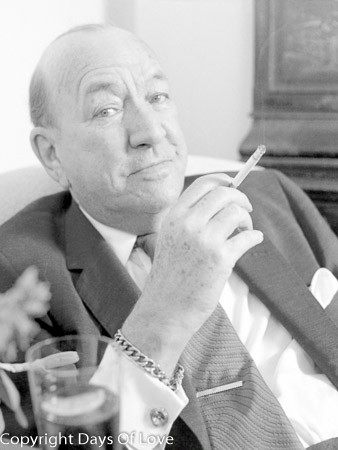 Sir
Noël Peirce Coward (16 December 1899 – 26 March 1973) was an English
playwright, composer, director, actor and singer, known for his wit,
flamboyance, and what Time magazine called "a sense of personal style,
a combination of cheek and chic, pose and poise".[1] Hollywood is an American drama web television miniseries about a group of aspiring actors and filmmakers during the Hollywood Golden Age in the post-World War II era trying to make their dreams come true.
Billy Boyd as Noël Coward, a fictionalized version of the playwright,
composer, director, and actor, portraing him as one of the usual guests of
George Cukor's infamous parties.
Coward was also friends with
Beverley Nichols. Coward had a number of lesbian and bisexual female
friends and appeared in countless double portraits with them, including
Gertrude Lawrence and
Gladys Calthrop displaying
himself as part of a "creative duo".
Sir
Noël Peirce Coward (16 December 1899 – 26 March 1973) was an English
playwright, composer, director, actor and singer, known for his wit,
flamboyance, and what Time magazine called "a sense of personal style,
a combination of cheek and chic, pose and poise".[1] Hollywood is an American drama web television miniseries about a group of aspiring actors and filmmakers during the Hollywood Golden Age in the post-World War II era trying to make their dreams come true.
Billy Boyd as Noël Coward, a fictionalized version of the playwright,
composer, director, and actor, portraing him as one of the usual guests of
George Cukor's infamous parties.
Coward was also friends with
Beverley Nichols. Coward had a number of lesbian and bisexual female
friends and appeared in countless double portraits with them, including
Gertrude Lawrence and
Gladys Calthrop displaying
himself as part of a "creative duo".
Coward maintained close friendships with many women, including the actress and author Esmé Wynne-Tyson, his first collaborator and constant correspondent; Gladys Calthrop, who designed sets and costumes for many of his works; his secretary and close confidante Lorn Loraine; the actresses Gertrude Lawrence, Joyce Carey and Judy Campbell; and "his loyal and lifelong amitié amoureuse", Marlene Dietrich.[125]
Born in Teddington, south-west London, Coward attended a dance academy in London as a child, making his professional stage début at the age of eleven. As a teenager he was introduced into the high society in which most of his plays would be set. Coward achieved enduring success as a playwright, publishing more than 50 plays from his teens onwards. Many of his works, such as Hay Fever, Private Lives, Design for Living, Present Laughter and Blithe Spirit, have remained in the regular theatre repertoire. He composed hundreds of songs, in addition to well over a dozen musical theatre works (including the operetta Bitter Sweet and comic revues), screenplays, poetry, several volumes of short stories, the novel Pomp and Circumstance, and a three-volume autobiography. Coward's stage and film acting and directing career spanned six decades, during which he starred in many of his own works.
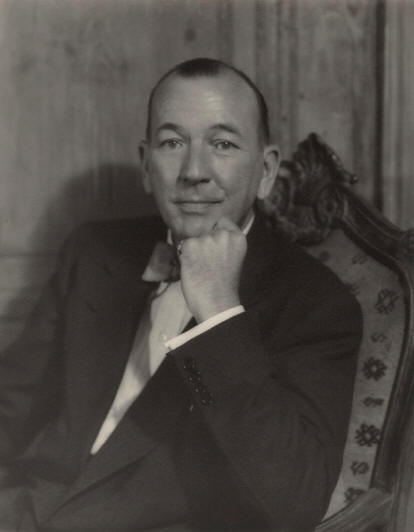
Noël Coward
by Paul Tanqueray
chlorobromide print, 1952
9 7/8 in. x 7 3/4 in. (250 mm x 196 mm) overall
Given by Paul Tanqueray, 1974
Photographs Collection
NPG x7259
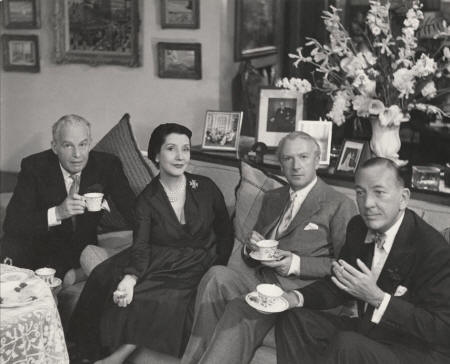
Alfred Lunt; Lynn Fontanne; Cecil Beaton; Noël Coward
by Paul Tanqueray
vintage bromide print, 1952
8 in. x 9 7/8 in. (204 mm x 252 mm)
Accepted in lieu of tax by H.M. Government and allocated to the Gallery, 1991
Photographs Collection
NPG x40493
![Museum of the City of New York - [Noel Coward, Alfred Lunt and Lynn Fontanne .]](http://www.elisarolle.com/images/images%20005/MNY265293.jpg)
Noel Coward, Alfred Lunt and Lynn Fontanne in Design for Living
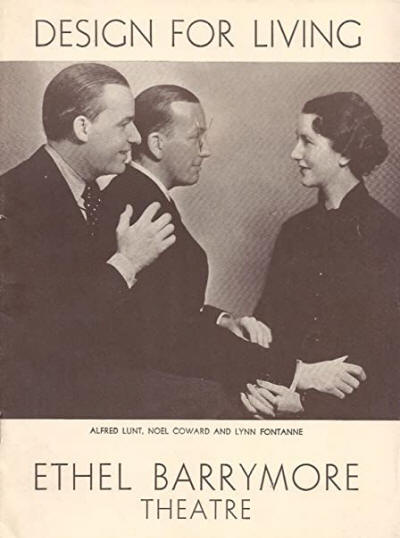
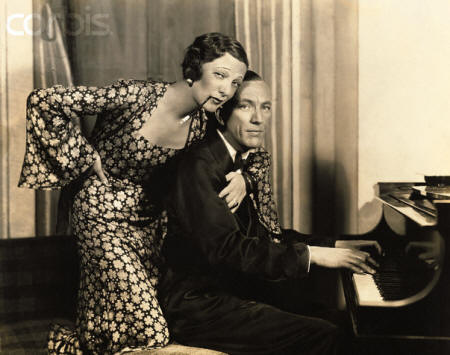
Gertrude Lawrence and Noel Coward in Private Lives
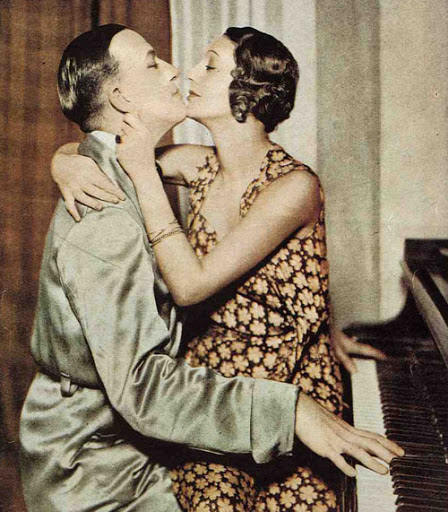
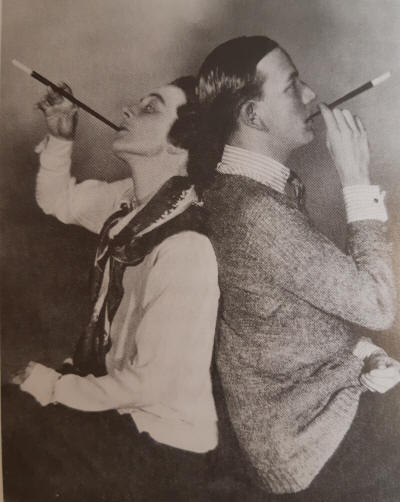
Double portrait of Noel Coward and Gladys Calthrop, by Maurice Beck and
MacGregor, 1924
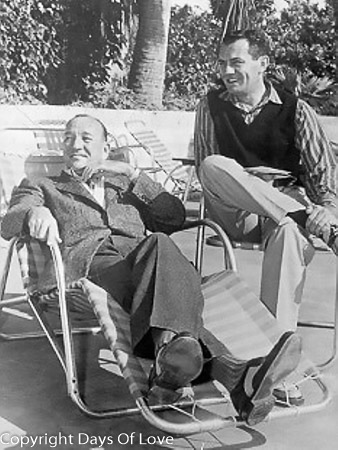
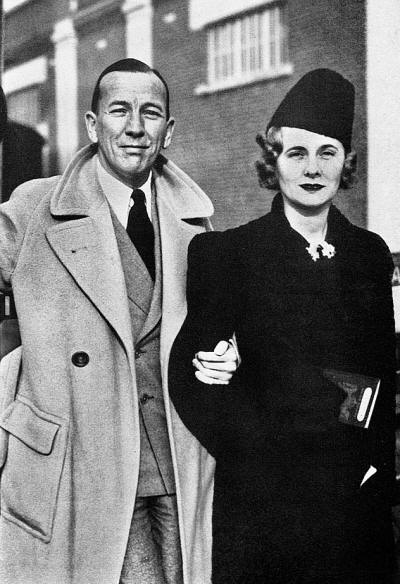
Doris Castlerosse and Noël Coward (she was reputedly the muse for his play Private Lives)
The Savoy, London
405 E 54th St
St. Paul's Church, London
Westminster Abbey, London
It was through Robbie Ross that Coward entered into the social world of queers and actors, having attended a party at his home. This was the only encounter the two enjoyed as Ross died two short days after meeting Coward on October 5, 1918, after suffering a heart attack brought on by the scandal. Ross' former friend Lord Alfred Douglas testified against him in a trial, outing him as the supposed "leader of all the sodomites in London".
The Vortex (1919) was Coward's first critically acclaimed and financially successful production and was staged simultaneously in both London (1924-1925) and New York (1924-1926). The play recounts the uncommon story of an over-sexed socialite Florence Lancaster (played by Lillian Braithwaite) and her son Nicky (Coward), a cocaine-addicted musical composer. Nicky is also obsessed with fashion and image. Coward's biographer claimed that Nicky's cocaine addiction was a cloacked index of the character's homosexuality, a white angelic powder hidden away from pubic view in a small snuffbox. Decades later, Derek Jarman wrote that "Coward put his sexuality in a little silver box and sniffed it" and the play's style was "confession as innuendo."
Noël Coward saw Manhattan for the first time on a "breathless June morning" in 1921. He was met by Napier Alington, Teddie Gerard, Gabrielle Enthoven, and Cécile Sartoris - a colourful, Bohemian group, all with a marked preference of their own sex. Coward stayed with Enthoven and Sartoris during this period. Recalling his stay with the two women, he wrote: ‘they said that when I sold a play, or made some money somehow, I could pay rent, but until then I was to be their guest […] I accepted and moved in immediately, grateful not only for their kindness, but for their company.' No one had told Coward that New York theatres closed during the summer months because of the oppressive heat, and he was unable to earn any money, let alone make his fortune. In the small flat with its dark wood furniture and whitewashed walls, the three friends stayed in on evenings when they could not afford to go to the movies. Wearing pyjamas and drinking red wine from the local Italian deli, they dined by the light candles in sconces, flames fluttering in a rare breeze on hot airless nights.
Coward's new friends led erratic lives. Sartoris and her girlfriend, Irene Dean Paul, earned money giving recitals of Verlaine's poems, set to music, in the houses of the wealthy; Cecile reciting in a 'rhythmic monotone', Irene singing 'in her husky, attractive "musician's voice"'. Lady Dean Paul had come to the United States "with an urgent determination to make money", and had left her husband and children in England to do so. The Polish Dean Paul was prone to sudden histrionic rages — 'vitriolic tirades against American houses, American culture, and American hostesses in particular' — and once tore up the cheque of a benefactor, throwing the pieces in her face, much to her partner's resentment. She lived on West 70th Street in a pitch-pine panelled apartment serviced by a stoic maid who was cashier to her impecunious mistress. Sometimes, 'when things looked especially black', Noel and Irene dressed up to dine and dance at Delmonico's, or on the Ritz roof, employing his illness-feigning tactic to avoid buying two meals. A luxurious respite from such stylised penury came with a weekend invitation from Florence Magee in Mount Kisco, when the lack of change to tip the servants was rectified by his luck at cards on the Sunday evening, providing him with a fortune of six dollars and fifty cents.
When the play moved from the Everyman Theatre, Hampstead, to the West End at the Royalty on December 16, 1924, Coward's understudy John Gielgud recalled how his "room looked very glittering, with large bottles of eau-de-cologne on the wash-stand and an array of dressing-gowns hanging in the wardrobe." "Noel", according to the young actor, "was charming." During this period, another admirer would grace the threshold of his dressing room. According to Coward, he "walked nervously, and with slightly overdone truculence into my life." That man was the American John "Jack" Chapman Wilson whose charm, equal to that of Coward's, proved to be his greatest asset and perhaps eventually Corward's greatest annoyance. Cole Lesley, whom Coward employed after Lorn Loraine in the mid-1930s as his personal secretary, described how Wilson, in addition to his "film-star looks", also had "an immense amount of charm, and with his sharp with he could be so funny that one forgave, or didn't even notice the mocking irony" of his words. Nonetheless, Wilson would become Coward's companion and primary lover. Wilson soon gave up his job as a stockbroker and assumed the position of Coward's personal manager. Jack was the youngest memeber of the so-called Coward's family, and was appropriately called "Bay-Bay", while Coward was known as "Pop". Personal secretary Lorn Loraine was the playwright's right hand, and was soon nicknamed "Mother Hen" and even at times "Girl Friday".
In 1926, Coward acquired Goldenhurst Farm, in Aldington, Kent, making it his home for most of the next thirty years, except when the military used it during the Second World War.[127] It is a Grade II listed building.[128] In the 1950s, Coward left the UK for tax reasons, receiving harsh criticism in the press.[129] He first settled in Bermuda but later bought houses in Jamaica and Switzerland (in the village of Les Avants, near Montreux), which remained his homes for the rest of his life.[130] His expatriate neighbours and friends included Joan Sutherland, David Niven, Richard Burton and Elizabeth Taylor, and Julie Andrews and Blake Edwards in Switzerland[131] and Ian Fleming and his wife Ann in Jamaica. Coward was a witness at the Flemings' wedding, but his diaries record his exasperation with their constant bickering.[132]
Despite becoming a trend setter in the mid-1920s, Coward would also become increasingly self-conscious about his own corporeal performance and publicity. Much later, on one occasion when with Marlene Dietrich, Coward famously asked: "Marlenah! I must not appear effeminate in any way. Do be a dear, watch out for anything that could be considered less than "butch," if you see me at all "queer," tell me immediately."
Radclyffe Hall wrote The Well of Loneliness in 1928. As usual, it contained sketches of people she knew: Noël Coward as Jonathan Brockett, for instance, and Natalie Barney as Valérie Seymour.
In "Mad About the Boy", a popular song with words and music by actor and playwright Noël Coward, introduced in the 1932 revue Words and Music, Noel Coward crooned that he was simply mad about a young gentleman. It was
a very open form of hiding one’s sexuality, a form necessary for same-sex
lovers living in the UK at that time, as male homosexuality was illegal and a
matter for the police and blackmailers. Coward had obvious reasons to fear
public knowledge of his sexuality, yet he was part of a metropolitan elite of
individuals able to enjoy their sexual lives as long as they employed certain
codes and discretion. In the song, Coward lets fellow same-sex lovers know
that he is a member of their fraternity, yet the context of the piece is
heterosexual; he sings as an infatuated woman. Coward sings, “Lord knows I’m
not a fool girl,” and ends with the declaration that he is “mad about the
boy.” In doing so, he is employing codes and signals already in general usage
with same-sex lovers (for instance, reference to the male self as female). The
use of polari or gay slang was common; it could be spoken in front of
heterosexuals, while remaining incomprehensible to those who were unfamiliar
with it (similar to cockney rhyme).
In 1932 Vogue published a two-page glam shot and exposé, "Glamour and the Lunts", in which Lynn Fontanne was pictured "dazzling" in a Lavin rose-and-blue crepe tea gown, while her husband Alfred Lunt lay elegantly on a velvet settee, cigarette poised at the ready near his lips. Fontanne and Lunt were Noël Coward's closest and best friends in the United States, with whom he first charted out their collective rise to fame, stardom and celebrity. It had been suggested that the threesome relationship in Design for Living, which Coward wrote and then played with Fontanne and Lunt was a semi-autobiographical account of their own relationship.
In his profession, Coward was widely admired and loved for his generosity and kindness to those who fell on hard times. Stories are told of the unobtrusive way in which he relieved the needs or paid the debts of old theatrical acquaintances who had no claim on him.[47] From 1934 until 1956, Coward was the president of the Actors Orphanage, which was supported by the theatrical industry. In that capacity, he befriended the young Peter Collinson, who was in the care of the orphanage. He became Collinson's godfather and helped him to get started in show business. When Collinson was a successful director, he invited Coward to play a role in The Italian Job. Graham Payn also played a small role in the film.[126]
Coward's political views were conservative, but not unswervingly so: he despised the government of Neville Chamberlain for its policy of appeasing Nazi Germany, and he differed sharply with Winston Churchill over the abdication crisis of 1936. Whereas Churchill supported Edward VIII's wish to marry "his cutie", Wallis Simpson, Coward thought the king irresponsible, telling Churchill, "England doesn't wish for a Queen Cutie."[133] Coward disliked propaganda in plays; "The theatre is a wonderful place, a house of strange enchantment, a temple of illusion. What it most emphatically is not and never will be is a scruffy, ill-lit, fumed-oak drill hall serving as a temporary soap box for political propaganda."[134] Nevertheless, his own views sometimes surfaced in his plays: both Cavalcade and This Happy Breed are, in the words of the playwright David Edgar, "overtly Conservative political plays written in the Brechtian epic manner."[135] In religion, Coward was agnostic. He wrote of his views, "Do I believe in God? I can't say No and I can't say Yes, To me it's anybody's guess."[136][n 10]
At the outbreak of the Second World War Coward volunteered for war work, running the British propaganda office in Paris. He also worked with the Secret Service, seeking to use his influence to persuade the American public and government to help Britain. Coward won an Academy Honorary Award in 1943 for his naval film drama, In Which We Serve, and was knighted in 1969. In the 1950s he achieved fresh success as a cabaret performer, performing his own songs, such as "Mad Dogs and Englishmen", "London Pride" and "I Went to a Marvellous Party".
Coward's most important relationship, which began in the mid-1940s and lasted until his death, was with the South African stage and film actor Graham Payn.[120] Coward featured Payn in several of his London productions. Payn later co-edited with Sheridan Morley a collection of Coward's diaries, published in 1982. Coward's other relationships included the playwright Keith Winter, actors Louis Hayward and Alan Webb, his manager Jack Wilson and the composer Ned Rorem, who published details of their relationship in his diaries.[121] Coward had a 19-year friendship with Prince George, Duke of Kent, but biographers differ on whether it was platonic.[122] Payn believed that it was, although Coward reportedly admitted to the historian Michael Thornton that there had been "a little dalliance".[123] Coward said, on the duke's death, "I suddenly find that I loved him more than I knew."[124]
Coward was homosexual but, following the convention of his times, this was never publicly mentioned.[54] The critic Kenneth Tynan's description in 1953 was close to an acknowledgment of Coward's sexuality: "Forty years ago he was Slightly in Peter Pan, and you might say that he has been wholly in Peter Pan ever since. No private considerations have been allowed to deflect the drive of his career; like Gielgud and Terence Rattigan, like the late Ivor Novello, he is a congenital bachelor."[42] Coward firmly believed his private business was not for public discussion, considering "any sexual activities when over-advertised" to be tasteless.[117] Even in the 1960s, Coward refused to acknowledge his sexual orientation publicly, wryly observing, "There are still a few old ladies in Worthing who don't know."[118] Despite this reticence, he encouraged his secretary Cole Lesley to write a frank biography once Coward was safely dead.[119]
By the end of the 1960s, Coward suffered from arteriosclerosis and, during the run of Suite in Three Keys, he struggled with bouts of memory loss.[103] This also affected his work in The Italian Job, and he retired from acting immediately afterwards.[104] Coward was knighted in 1969 and was elected a fellow of the Royal Society of Literature.[105] He received a Tony Award for lifetime achievement.[106] In 1972, he was awarded an honorary Doctor of Letters degree by the University of Sussex.[107]
His plays and songs achieved new popularity in the 1960s and 1970s, and his work and style continue to influence popular culture. Coward did not publicly acknowledge his homosexuality, but it was discussed candidly after his death by biographers including Graham Payn, his long-time partner, and in Coward's diaries and letters, published posthumously. The former Albery Theatre (originally the New Theatre) in London was renamed the Noël Coward Theatre in his honour in 2006.
Coward died at his home, Firefly Estate, in Jamaica on 26 March 1973 of heart failure[47] and was buried three days later on the brow of Firefly Hill, overlooking the north coast of the island.[108] A memorial service was held in St Martin-in-the-Fields in London on 29 May 1973, for which the Poet Laureate, John Betjeman, wrote and delivered a poem in Coward's honour, [n 9] John Gielgud and Laurence Olivier read verse and Yehudi Menuhin played Bach. On 28 March 1984 a memorial stone was unveiled by the Queen Mother in Poets' Corner, Westminster Abbey. Thanked by Coward's partner, Graham Payn, for attending, the Queen Mother replied, "I came because he was my friend."[110]
The Noël Coward Theatre in St. Martin's Lane, originally opened in 1903 as the New Theatre and later called the Albery, was renamed in his honour after extensive refurbishment, re-opening on 1 June 2006.[111] A statue of Coward by Angela Conner was unveiled by the Queen Mother in the foyer of the Theatre Royal, Drury Lane in 1998.[112] There are also sculptures of Coward displayed in New York and Jamaica,[113] and a bust of him in the library in Teddington, near where he was born.[114] In 2008 an exhibition devoted to Coward was mounted at the National Theatre in London.[115] The exhibition was later hosted by the Museum of Performance & Design in San Francisco and the Academy of Motion Picture Arts and Sciences in Beverly Hills, California.[116]
My published books: